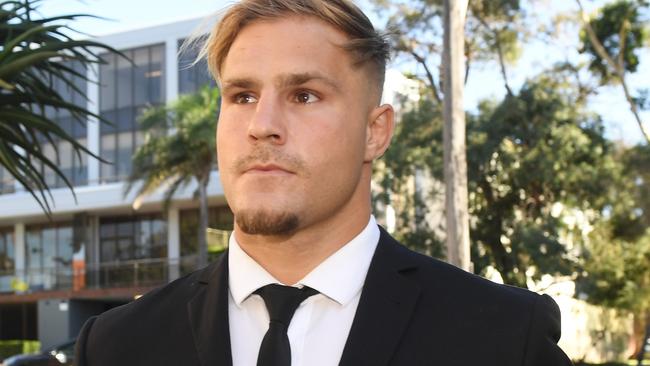NRL star Jack de Belin faces court on rape charge
Graphic details of Jack de Belin’s alleged rape of a 19-year-old in Wollongong have emerged after he pleaded not guilty in court.

Graphic details of NSW State of Origin player Jack de Belin’s alleged rape of a 19-year-old woman in Wollongong at the end of last year have emerged after he pleaded not guilty in court yesterday.
In police documents before the court, St George Illawarra Dragons lock de Belin is alleged to have come out of the shower naked, thrown the teenager on the bed, ripped off her clothes and had his hand around her throat while he raped her.
After allegedly having sex with the woman, he is alleged to have turned to his friend, Callan Sinclair, and asked him if he wanted to have sex with her too.
Police say de Belin and Sinclair met the woman in a Wollongong bar on December 9 last year, and told her they wanted to charge their phones before continuing their night and heading off to another nightclub.
It is alleged de Belin and Sinclair took her to the apartment of de Belin’s cousin, where police say she was raped as she pleaded with them to “stop” and was screaming in pain.
The St George Illawarra Dragons player successfully applied to have his bail conditions relaxed so he did not need to report to police every Monday and Friday while he prepared for the upcoming NRL season.
Police prosecutor Sean Thackray argued the “nature and seriousness of the offence” should prohibit any relaxation of bail conditions. Magistrate Roger Clisdell conceded it was a strong case against de Belin, but allowed the application to vary his bail conditions.
Mr Clisdell also said de Belin was not allowed to visit any international point of departure, unless he was travelling on an airport train line.
De Belin’s barrister, David Robert Campbell SC, said de Belin had a heavily pregnant wife and needed the less onerous bail conditions to train.
“The proceedings have to take their course in the usual way and there’s really nothing more he can say,” Mr Campbell said outside court. “Obviously, it was an essential (bail) variation because he wouldn’t be able to continue playing football with the team, pursuant to his contract, if we didn’t get it.”
NRL chairman Peter Beattie said the standing policy was to allow NRL players to continue to play unless “clear evidence” was before sports administrators. Everyone had the right to the presumption of innocence, but “If the matter goes before the court and there’s a conviction then we can act upon it,” he said.





